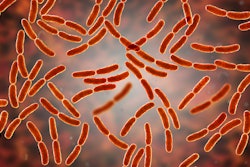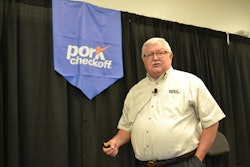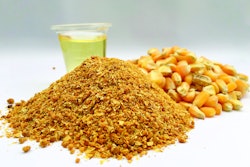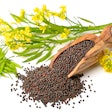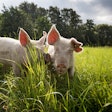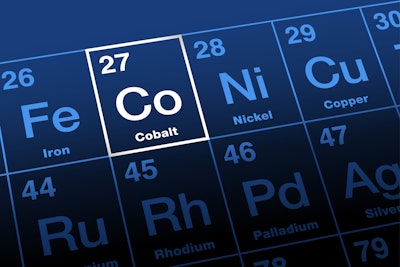
Scotland’s farmers have welcomed the emergency authorization of cobalt compounds added to the diets of specified livestock.
Approval was granted last week by the Scottish government, according to the National Farmers Union of Scotland (NFU Scotland). The emergency authorization comes into effect from June 30, and the authorization period runs from July 15, 2023, to July 14, 2026.
Previously, the organization had urged the government to make this provision urgently in order to prevent the imminent end to the authorization of various cobalt compounds as feed additives. This would have had severe adverse impacts on the health and welfare of Scottish livestock, it said.
“Cobalt supplementation is essential to our livestock industry, in particular our sheep sector,” said NFU Scotland’s Livestock Policy Manager Lisa Hislop. “Cobalt is a vital element for healthy animals and deficiency can result in debilitation, anemia, emaciation and stunted growth. With 63% of Scotland’s land at high risk of cobalt deficiency, it is estimated that 75% of Scottish lambs and 40% of breeding ewes are regularly given cobalt.”
Without the latest emergency authorization by the government, cobalt salts would not have been a permitted in ruminant feeds in Scotland from next month. This would have coincided with the peak demand for cobalt supplementation, which is in spring-born lambs grazing hill pasture.
“We welcome the prompt decision from Scottish government to allow emergency reauthorization of cobalt to maintain good animal health in Scotland,” Hislop said.
According to the Scottish Parliament legislation, the latest authorization covers the use of four cobalt II salts in premixes to be included in compound feed. Species covered are ruminants with a functioning rumen (plus five other specific animals groups but neither poultry nor swine).
In general, the document recommends limiting the supplementation with cobalt to 0.3mg/kg in complete feed. However, this can be adjusted for the risk for cobalt deficiency due to local conditions, and feed composition.
Cobalt authorization elsewhere in the United Kingdom
Elsewhere in the United Kingdom (U.K.), the authorization of the same forms of cobalt in animal feeds also expires in July.
For England and Wales, the government’s Food Standards Agency (FSA) opened the matter for public consultation. This sought the views of stakeholders on proposed provisional and urgent authorizations of four cobalt (II) compounds. Specifically, these forms are cobalt (II) acetate tetrahydrate, cobalt (II) carbonate, cobalt (II) carbonate hydroxide (2:3) monohydrate, and cobalt (II) sulfate heptahydrate.
Among FSA’s aims are ensure the continued supply of essential cobalt compounds to the market in Great Britain, to protect animal welfare, and to support national food security.
According to the agency, the normal public consultation period was shortened so that new provisions can be applied before the existing authorizations expire on July 15, 2023.
The consultation period has closed. Subject to its outcome, the FSA will ask ministers to consider authorizing these additives for a further five years.
Cobalt controversy
An essential trace element, cobalt is needed for the nutrition of ruminants and some other animal species, according to the FSA. This is because of its association with vitamin B12, for which there is no alternative. However, most forages, pasture and feed ingredients for sheep and cattle contain sub-optimal levels of cobalt to meet the requirements of these animals.
As a result, cobalt is used as a feed additive, and in differing forms to suit a range of feed types.
A report of disease surveillance in 2021 found that around 8% of the farm animals submitted for post-mortem examination were cobalt deficient.
FSA states that removal of cobalt supplementation is likely to increase exponentially the number of animals affected, and negatively affect the national herd and flock.
However, the European Food Safety Authority (EFSA) published an opinion on the safety of cobalt in 2012. It recommended restricting use of cobalt compounds to feeds for ruminants, horses and rabbits only. Furthermore, it concluded that maximum total cobalt levels should be lowered, and that handling of the additives should be restricted to the premix sector only.
These conclusions were based on the knowledge that cobalt compounds are irritants to the skin and eyes, as well as being dermal and inhalatory sensitizers. As a result of their varying dusting potential and their toxicological profile, cobalt products are a hazard during handling, said EFSA. Exposure by inhalation must be avoided, the agency urged.
Feed industry feared prospect of limited cobalt options
Among the views of the industry were that animal health would be at risk if the cobalt compounds ceased to be available, according to the FSA. This could also lead to deficiencies of other minerals.
While one cobalt compound — coated cobalt (II) carbonate — would remain on the British market, it has limited applications as it is insoluble in water. Costs to the feed industry could increase. This would arise in case of a need for product reformulation, as it would require withdrawal from the market for a period of 6-20 months while the new version was developed and licensed.
Lastly, the industry stated that the currently authorized cobalt compounds have been widely used for years without any safety concerns.
Cobalt nutrition in cattle and sheep
In cattle and sheep, cobalt deficiency generally only occurs in certain geographical areas, where the animals consume grass or other crops grown on cobalt-deficient soils. According to the U.K.’s National Animal Disease Information Service (NADIS), ruminants require dietary cobalt for the rumen microorganisms to make vitamin B12.
In these species, main signs of cobalt deficiency are poor appetite, reduced growth and anemia. Skin and hair/wool quality may be adversely affected.
Treatment may require vitamin B12 injections over several weeks, while prevention involves application of slow-release rumen boluses, or frequent cobalt drenches.
In sheep, cobalt deficiency is more common than in cattle. Particularly susceptible are weaned lambs in the late summer and autumn/fall, when deficiency may exacerbated by parasitic gastroenteritis.
Adult sheep are less likely to be affected than young animals. However, cobalt-deficient ewes may be less fertile and poor mothers, according to NADIS.
Two months ago, a Feed Strategy blog explored why the future of cobalt in feeds in the European Union may be in question.
Furthermore, recent articles have covered cobalt concentration in roughages and in grains for ruminants.


